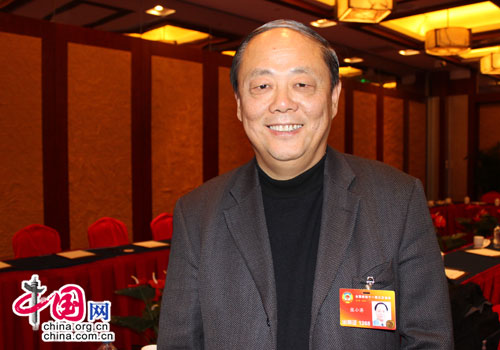Economic structure needs change, but exports still crucial
Although the voice for shifting the focus of China's economy from exports to domestic consumption is gaining strength, exports will remain the key factor for GDP growth for the next few years.
Zhang Xiaoji, a member of the National Committee of the Chinese People's Political Consultative Conference (CPPCC), says China should slowly move in the direction of domestic consumption.
|
|
|
Zhang Xiaoji is the director of the Research Department of Foreign Economic Relations under the Development Research Center of the State Council. [Wang Ke / China.org.cn] |
"Adjusting the economic growth pattern cannot be done overnight. In other words, exports are still crucial and should be supported," Zhang told China.org.cn during the on-going parliamentary session which began on March 3.
Chinese exports were on the rise for many years, contributing a large part to the country's stable economic progress. Yet after the 2008 global financial crisis hit, many policymakers started to rethink the country's export-related policies.
On March 5, Premier Wen said in a government report that China will continue to maintain an active fiscal policy in 2010, encouraging domestic spending, adjusting the economic structure and stabilizing exports to ensure an 8 percent GDP growth.
"The government still plans to bolster employment and the economy, while emphasizing the need to support the export sector in the face of the financial crisis," he said. "At this point, there is no change in our policy."
A Xinhua report says that despite overtaking Germany as the world's largest exporter, China saw its exports in 2009 down by 16 percent compared with 2008. And according to customs data, China's target of 8 percent growth in exports for 2010 is far below 2008's 17.2 percent increase. But Zhang says the 8 percent target is a good sign and there are still other ways to improve the sector.
"The exports volume is not expected to recover to the level before the global financial crisis, but we can focus on its quality rather than the quantity."
Li Ruogu, chairman of the Export-Import Bank of China and one of China's three policy lenders, noted that the country shouldn't change its policies when the global economy is so shaky. "China's exports remain uncertain and it is too early to predict a full economic recovery," he said.
According to Minister of Commerce Chen Deming, export-related sectors provide at least 90 million jobs, which is about 7 percent of the nation's population.
Zhang urged the government to cultivate the national exports base. "Maybe we can expand exports with independent intellectual property rights, high technology and high added value," he said.
He also noted the need to support the export sector by encouraging private enterprises to invest abroad. Earlier this week, Director of the State Administration of Foreign Exchange Yi Gang agreed, saying most of China's overseas assets are currently government-invested.
"The government should give a boost to investments by the private sector. Private enterprises cannot wholly depend on foreign exports," Yi told China.org.cn.
"If they want to become bigger and stronger, these companies should cast their eyes on the global market."
In strengthening the economy, some people have also suggested that the government allocate its foreign exchange reserves to the domestic market. But Zhang thinks it is another complicated matter.
"The foreign exchange reserves cannot be considered a disposable asset. Only when people exchange their foreign currency for the equivalent in RMB, can it be used," Zhang said.
 0
0 








Go to Forum >>0 Comments